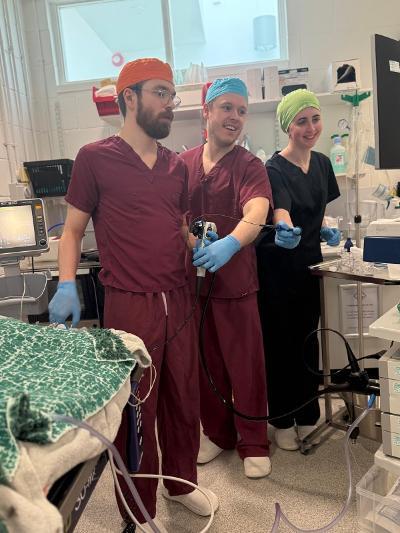A day in the life of an intern
For more of an insight on what our interns do day to day, here's what one of our recent interns told us about a typical day in the SATH. Over to Luke:
"8 AM: The day starts with checking in with the overnight team and reviewing hospitalised patients before ward rounds.
8:40 AM: Rounds! This is where every service discusses their patients, plans the day and assigns new consultations and procedures to the team. Our students are also included in rounds, this helps to facilitate their learning in a practical case-based way.
9 AM - 1 PM: Consultations! Chat with owners, collaborate with specialists and admit patients for further care and investigations if needed.
After lunch it's investigations and procedures! Whether it's imaging such as x-rays or MRI scans, biopsies (taking tissue samples), endoscopy (looking inside the body with a special camera) or surgery, this is where the action happens. If I'm on a surgical rotation it could be a TPLO (surgery on the knee of a patient with a cruciate ligament injury) or spinal surgery and if I'm on a medicine rotation it could be video otoscopy (where a camera is placed in the ear canal) or gastrointestinal endoscopy.

3-4:40 PM: discharging patients, updating owners, finalizing patient care plans, administrative work and writing update letters to primary care vets.
4:40 PM: Rounds again! Here we discuss patients again and hand over to the out-of-hours team.
After rounds: wrap up for the day, prepare for tomorrow and maybe assist with anaesthesia on late cases if I'm on call. Most days wrap up around 6 PM, sometimes earlier if things run smoothly, sometimes later if it’s a hectic one.
We do a lot of teaching & learning. There is hands-on teaching with students, plus endless opportunities for your own growth (even research if that’s your thing!). We also take part in book and journal clubs (evaluating research studies and analysing important textbooks) and discussions of interesting cases - we are always learning! We get plenty of real case experience with direct involvement in cases, procedures & owner communication to prepare us for the next step in our careers. I recently applied for and was successful at progressing to an Internal Medicine residency here!
No two days are the same, but that’s what makes it exciting!"